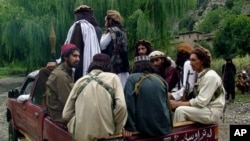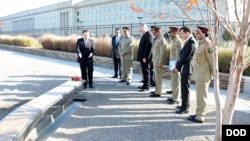Senior Pakistani officials insist key international partners support a new push by Islamabad to resume stalled peace talks between the Taliban and the Afghan government. But they say further progress is not possible unless Kabul supports the negotiations.
Pakistan brokered and hosted a groundbreaking meeting between Taliban and Afghan officials in early July — the first direct interaction in 14 years — that raised hopes for a peaceful settlement to the conflict in Afghanistan. U.S. and Chinese officials attended the discussions as observers.
But a second round of talks scheduled days later were not held after it was revealed longtime Taliban leader Mullah Omar had died two years ago.
Since then, the Taliban has expanded its insurgent activities to more areas of Afghanistan than at any time since 2001.
The developments re-ignited deeply-rooted suspicions in Afghanistan about Pakistan’s peace efforts. In early August, Afghan President Ashraf Ghani told the neighboring country he did not need its help in promoting reconciliation with the Taliban. He and other Afghan officials have since increasingly accused the Pakistani military of not cutting its covert support to the Islamist insurgency.
'Baseless' allegations
Pakistani officials say the “baseless” allegations following the disruption of peace talks left Islamabad with no choice but to convey to Kabul it would not pursue the reconciliation process as long as Afghans are “dissatisfied" and have “reservations" about Pakistan’s role it.
“We are now waiting for any initiative or a specific request from President Ashraf Ghani himself to allow us to resume the reconciliation process," Tariq Fatemi, a key foreign policy advisor to the Pakistani prime minister told a local television station this week.
But so far there has been no indication from the “principal party” (the Afghan government), he added. In the meantime, Fatemi said, many friendly countries have conveyed to Pakistan they want the resumption of the Afghan reconciliation process because “in their assessment too, it is the only serious and viable option” to end the war in Afghanistan.
President Ghani, while referring to the maiden Pakistan-brokered July peace talks, told an Afghan youth delegation in Kabul last week that the enemy conspired to bring “two political geographies” to the Afghan soil.
“Their aim was to force us to share the table (with the Taliban) as equals and force the president of Afghanistan to beg for sitting on that table,” Ghani told the gathering, without naming Pakistan. “I am not the kind of person who would beg for such talks."
Ghani has also complained that while Pakistani leaders promised to promote peace and stability in his country, they have not upheld commitments to pressure the Taliban to reduce the violence in Afghanistan.
Speaking to reporters earlier this month in Kabul, the U.S. commander of the NATO-led forces, General John Campbell, backed Ghani’s stance.
“President Ghani was very direct and very measured in what he has asked of Pakistan and things they had needed to do to comeback before the peace process can go further. And I think one of the biggest things is that there has to be a reduction in violence before we move forward. He has got to see that. He cannot continue to reach out and not get anything in return,” he said.
US visit
Pakistan’s military chief, General Raheel Sharif, met last week with senior U.S. administration and military officials during his five-day visit to Washington. The discussions primarily focused on resuming the Afghan reconciliation process.
Army spokesman Lt. General Asim Bajwa said that both sides agreed the peace process should be resumed without further delay.
“We will have to carry it forward with consistency,” said Bajwa, adding that Pakistan and the United States have also agreed to make joint efforts to remove “obstacles” that are delaying the progress. The spokesman did not elaborate.
Pakistan is scheduled to co-host with Afghanistan an important meeting of the "Heart of Asia" conference in Islamabad next month, where the war-shattered country’s regional and international partners will discuss ways to promote Afghan political and economic stability.
Afghan officials say President Ghani's attendance at the conference is linked to steps that Pakistan initiates towards reducing violence in Afghanistan.
There are also reports that Pakistani military chief Sharif is likely to visit Kabul in the coming days to carry forward discussions he recently held with U.S. officials. However, a senior Pakistani official told VOA there are “no confirmed plans yet” about Sharif’s visit to Afghanistan.
The succession dispute that erupted among the Taliban following the announcement of the death of its founder, Mullah Omar, has also posed fresh challenges to the Afghan reconciliation efforts and raised questions about the group’s integrity.
But observers say the appointment of its new head of the Qatar political office and recent battlefield victories are indications Omar’s successor, Mullah Akhtar Mansoor, has consolidated his control over the Taliban.






